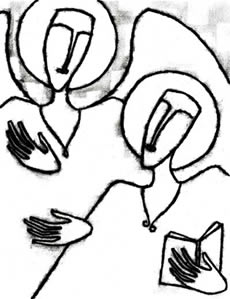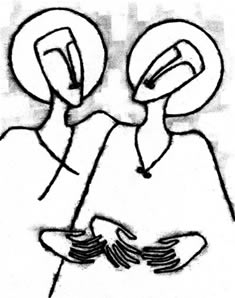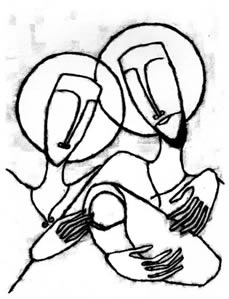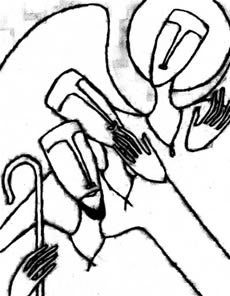
|
"Awesome Things That We Did Not Expect"
For Sunday November 30, 2008
First Sunday in Advent
Lectionary Readings (Revised Common Lectionary, Year B)
Isaiah 64:1–9
Psalm 80:1–7, 17–19
1 Corinthians 1:3–9
Mark 13:24–37
 |
Annunciation to Mary. |
I think it was Stanley Hauerwas who somewhere wrote that Christians have forgotten how to beg. That's the price we've paid for our sense of privilege that expects everything here and now. But you couldn't say that about Isaiah the prophet or Asaph the psalmist. They definitely knew how to beg.
The greatest debacle for Jews in the Old Testament was why God had given them over to their pagan enemies Assyria (722 BC) and Babylon (586 BC) who vanquished them. "Our holy and glorious temple," Isaiah cries, "has been burned with fire, and all that we treasure lies in ruin" (Isaiah 64:11).
How long must Israel wait for God's mighty acts of deliverance? Had they not become a mockery to their neighbors? Asaph begs God to save His people, and complains that He has made them "drink tears by the bowlful" (Psalm 80:5–6). Isaiah's elegant poetry wistfully recalls the long gone days when God had wielded his "glorious arm of power" and Moses had led the exodus from Egypt that humiliated Pharaoh. But in his own day Isaiah could only wonder, "where are your zeal and your might? We all shrivel up like a leaf. …You hide your face from us" (Isaiah 63:15, 64:6, 7).
Isaiah and Asaph beg God to prove Himself by visible demonstrations of power. "Hear us, shine forth, awaken your might, come and save us, restore us, return to us, look down from heaven and see us, revive us, O Lord Almighty!" (Psalm 80). Isaiah dispenses with all nuance and subtlety: "Oh, that you would rend the heavens and come down, that the mountains would tremble before you!" (Isaiah 64:1). He cajoles God to "come down" like fire to tinder that causes water to boil, and to perform "awesome things we did not expect."
 |
Visitation. |
Sometimes there's a painful disconnect between what we fervently pray for and what we actually experience. Praying to God for mighty acts of deliverance is an entirely human and genuinely Christian response to the suffering of the world. I intend never to stop praying for God's miraculous intervention; those prayers remain a staple of my morning walks. Who would not beg God to rescue Congo and Zimbabwe from the dark forces ravaging those lands? What parent doesn't lay awake at night praying that their kid makes it home safely from a party? Who wouldn't beseech God when they see a police car pull into their neighbor's driveway? Lord, wake up! God, come down!
The season of Advent ads an important nuance to our prayers.
God is not our Cosmic Concierge. Human experience belies the delusion and pious happy talk, so deeply embedded in the American sense of entitlement, that the Gospel solves every problem and answers every question. Rather, God offers us a way to live without answers to questions and with problems that don't disappear. Advent reminds us that sometimes we must wait, and that God acts in His own time, in His own ways, and for His own reasons.
After twenty years as a professor at Notre Dame, Yale, and Harvard, the Catholic priest Henri Nouwen (1932–1996) moved to a home in Toronto for the severely handicapped called Daybreak. The temptation of Jesus to turn stones into bread, Nouwen suggests, is the temptation to be "relevant," that is, to do something concrete about the world's suffering: "Oh, how often I have wished I could do that! Walking through the 'young towns' on the outskirts of Lima, Peru, where children die from malnutrition and contaminated water, I would not have been able to reject the magical gift of making the dusty stone-covered streets into places where people could pick up any of the thousands of rocks and discover that they were croissants, coffee cakes, or fresh-baked buns, and where they could fill their cupped hands with stale water from the cisterns and joyfully realize that what they were drinking was delicious milk."
 |
Nativity. |
Nouwen begs God like Isaiah, "Oh, God, split the heavens and come down! Prove yourself! Do something!"
At Advent, though, we wait. Even though Costco displayed their seasonal merchandise in October, Christmas is still a long way off. The winter solstice will envelope us in the longest night and the shortest day of the year. Leaves will fall and grass will fade to brown. So we enter a season of waiting, and God, writes Isaiah, "acts on behalf of those who wait for him" (64:4). Paul sounds the same note, commending the Corinthians for "eagerly waiting for our Lord Jesus to be revealed" (1 Corinthians 1:7).
But "no one knows," says Jesus, the day or hour when God will act, "not even the angels in heaven, nor the Son" (Mark 13:32). He compares our situation to servants who wait for their master who has gone on a long journey without saying when he'll return. Our task is to remain vigilant and to "watch!" (13:37). Patient waiting is not an excuse to avoid helping those whom we can help; but there will always be plenty of unresolved heartaches this side of heaven that require us to cultivate endurance, confidence, and hope through waiting.
We wait in patience, knowing that not every act of God resounds like a pounding sledge hammer. In Isaiah's metaphor, God does not always split open the heavens. Whereas even His closest disciples longed to call down fire from heaven and to brandish swords, Jesus compared his coming kingdom to tiny mustard seeds and to the imperceptible but certain fermentation of yeast. In his classic advent hymn, O Little Town of Bethlehem (1868), Phillip Brooks, a university preacher at Harvard where today a house is named for him, described the discipline of patient waiting for the invisible kingdom that emerges bit by bit:
How silently, how silently, the wondrous gift is given!
So God imparts to human hearts the blessings of His heaven.
No ear may hear His coming, but in this world of sin,
Where meek souls will receive Him, still the dear Christ enters in.
 |
Annunciation to the Shepherds. |
Some first century Jews longed for a powerful leader to rout the oppressive Romans. God did answer their prayers, but in a manner that was easy to miss. Instead of military might, He sent a baby born in a barn. At Advent we re-enact their watching and waiting, their prayers and longings, alert to God's whisper as well as His shout: "Restore us, O Lord Almighty; make your face shine upon us, that we may be saved" (Psalm 80:3, 7, 19).
For further reflection:
* Where in your life do you wait for God to act?
* What obstacles challenge you to patient and confident waiting?
* Can you identify clear instances where God acted definitively yet silently, almost imperceptibly?
* How might Advent cultivate in us a healthier discipline of waiting?
* Consider the saints who "did not receive what had been promised" (Hebrews 11:13). They received something far different: "Others were tortured. . . . some faced jeers and flogging, while still others were chained and put in prison. They were stoned; they were sawed in two; they were put to death by the sword. They went about in sheepskins and goatskins, destitute, persecuted and mistreated — the world was not worthy of them. They wandered in deserts and mountains, and in caves and in holes in the ground. These were all commended for their faith, yet none of them received what had been promised" (11:35–39).
* Consider the critics who mocked early believers: "Where is this 'coming' he promised? Ever since our fathers died, everything goes on as it has since the beginning of creation" (2 Peter 3:4).
Image credits: All four images are by Jan L. Richardson of the Wellspring Studio. Used by permission. See www.janrichardson.com. Be sure to visit Jan's Advent blog (theadventdoor.com) and The Painted Prayerbook (paintedprayerbook.com).





